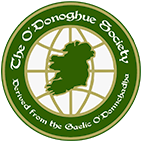Last viceroy of Mexico, born in Spain in the last half of the 18th century; died in Mexico, 8 October, 1821. He was descended from an Irish family that had been established in Spain for nearly a century. He entered the military service, and, during the invasion of Spain by Napoleon in 1808, the provisional government of Cadiz appointed him minister of war. In this post he displayed great activity, but at the restoration of Ferdinand VII. and the abrogation of the constitution in 1814, O’Donoju suffered for his adherence to the Constitutional party, was accused of conspiring against the king, and imprisoned, but, as nothing serious could be proved, he was released and appointed adjutant 1o the king in 1820. In 1821, after the deposition of the viceroy Apodaca, O’Donoju, whose liberal ideas were well known, was appointed viceroy of Mexico, and on 3 August arrived in Vera Cruz, which he found closely surrounded by the Independents. He issued a liberal proclamation, offering to give the country full self-government, and through Santa-Anna, commanding the immediate independent forces, entered into communications with Iturbide, and an interview was arranged to take place in Cordova. He left Vera Cruz on 19 August, met Iturbide on the 23d, and on the next day the treaty of Cordova was signed, recognizing the independence of Mexico under the immediate rule of Ferdinand or a member of his family. In ease of their refusing the crown, the Mexicans were to elect their ruler, and the government was to be administered meanwhile by a junta, of which O’Donoju and Itur-bide were to be members. General Novella, provisionally in charge of the viceroyalty, refused to recognize this agreement or O’Donoju’s authority, but after an interview with the latter on 13 September, acknowledged him as chief and proclaimed him viceroy on the 15th. On 26 September, O’Donoju made his entry into the capital, on the next day the independent army under Iturbide entered amid great festivities, and on the 281h the act of independence was signed, O’Donoju entering on his function as a member of the governing junta. He fell sick soon afterward, and died of pleurisy, or, as some writers assert, of poison.
Notifications
